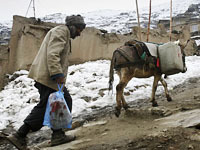Afghanistan claims new territories from its neighbors
 Afghanistan wants to obtain the new territories at the expense of its neighbors. This was openly declared on October 19 by the head of the Afghan Geodesy and Cartography control Fazil Ahmad Hedayat. According to him, the international law provides for the revision of boundaries every 20 years, since the river borders change from time to time.
Afghanistan wants to obtain the new territories at the expense of its neighbors. This was openly declared on October 19 by the head of the Afghan Geodesy and Cartography control Fazil Ahmad Hedayat. According to him, the international law provides for the revision of boundaries every 20 years, since the river borders change from time to time.

Fazil Ahmad Hedayat drew particular attention to the fact that the borders with Iran and Pakistan should be reconsidered as well. According to Hedayat, Tehran and Islamabad have usurped a number of Afghan territories. However, as the official lamented, now the demarcation of the borders with these states is not possible due to unnamed political reasons.
Most likely, Kabul does not demand the demarcation of borders with Iran and Pakistan because of fears that the authorities of these countries will ask millions of Afghan refugees to leave their territories. Their appearance at home will cause a humanitarian catastrophe in Afghanistan.
In turn, as pointed out by the Director of the Centre for Afghanistan and the region Kosimsho Iskandarov, "Unsolved problems of the border will have a negative impact not only on the Afghan-Pakistan relations, but the entire region ... Pakistan is not interested in a strong and independent Afghanistan. There were two factors affecting the instability - the line of Durand and the support of the idea of a Pashtunistan."
Until the problem of the border is solved and Afghanistan has territorial claims to Pakistan, Pakistan will not be interested in establishing peace in Afghanistan. Everyone understands that the creation of Pashtunistan will lead to the disintegration of the country. This problem has been complicating the relations between the two countries over the past 60 years. Some experts believe that it is necessary to recognize the Durand Line (carried out by the British after three Afghan-British war and rejected by Kabul. - Ed.) as an international border."
However, this does not mean that the relevant claims will not be filed against Iran and Pakistan in the future. So far, according to news agency Pazhvak, Afghanistan's main claims are to the former Soviet republics - Tajikistan, Uzbekistan and Turkmenistan.
The basis for the territorial claims is that the alleged boundary river Panj and Amu has noticeably changed its course. As a result, part of the territory of Tajikistan, Uzbekistan and Turkmenistan turned out to be on the left, the Afghan bank. This means that Afghanistan, under existing international treaties, can really claim these lands.
In particular, this can be a small area of Hamadoni Khatlon, a region in Tajikistan. This fact, according to several news agencies, was established by a joint Afghan-Tajik commission in January of 2008. Now the official Kabul consistently offers its northern neighbors to establish a special commission for the four-way harmonization of the demarcation of the border.
However, so far no particular desire on their part to transfer part of its territory has been observed. First, they have a strong suspicion that if the river suddenly changed its course not in favor of Afghanistan, Kabul will not return the land, citing, for example, that earlier international agreement in force is outdated.
Second, the post-Soviet leaders are well aware that the transfer of even a small piece of land may serve as a basis for further criticism of their actions on the part of fledgling opposition. The situation in this respect will be particularly complex for the Tajik President Emomali Rakhmonov, who recently handed over to China-one percent of its territory in the Pamirs. This action provoked fierce criticism of both the Tajiks and ethnic Pamiris, and the new territorial concession will clearly not lead to calming of the unrest.
Third, the former Soviet republics of Central Asia, transferring part of their territory to the Afghan neighbor, cannot be sure that Kabul will not set new, this time, not historical claims. Remember the border dispute between Uzbekistan and Afghanistan that dates back to the days of the existence of the Emirate of Bukhara. The Uzbek authorities cannot completely ignore the Afghan claim. The alleged defenders of the Karimov regime pointed out that the Andijan uprising in 2005 was largely inspired by Afghanistan.
It should be noted that the desire to move the boundary, by a strange coincidence, was announced on the very day that the U.S. Secretary of State Hillary Clinton arrived unexpectedly in Kabul with an unplanned visit to meet with the leaders of Afghanistan.
According to Afghan sources, "the secretary wanted to demonstrate her support for Afghanistan." There is no doubt that the actions of the Afghan puppet government in this important matter had been agreed with the Americans. It is possible that in the medium term the territorial claims put forward by Afghanistan will be the starting point for the serious tension in the region.
Sergei Balmasov
Pravda.Ru
Subscribe to Pravda.Ru Telegram channel, Facebook, RSS!


